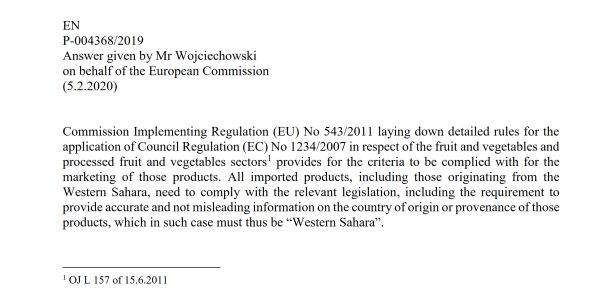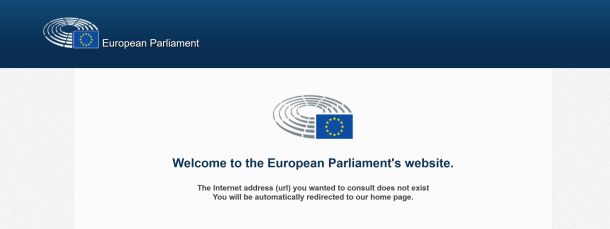
Several EU Member States have issued statements indicating their support to Council's decision to appeal the European Court’s decision to annul the EU’s agricultural agreement with Morocco. But why is that, really?
The Court Of Justice of the European Union (CJEU) decided on 10 December 2015 to annul the EU-Morocco agricultural deal in so far as it was applied in Western Sahara – a Non-Self Governing Territory that is largely under Moroccan military control since 1975.
Morocco was less than amused.
On 25 February, Morocco stated that it would stop all communication with the European Union – an official confirmation of what most EU officials had already observed in practice. Morocco does not appreciate that its “sovereignty” over Western Sahara is now being questioned. The Court had stated that Morocco has no mandate whatsoever to administer Western Sahara. No State in the world recognizes Morocco’s claim over its southern neighbour.
Morocco has not only closed off the lines of communication, it is also refusing cooperation in several multi-million bilateral programs, including on security exercises. As if its intransigence on anti-terror programs wasn’t enough to unnerve EU decision makers, playing hard-ball on the EU’s envisioned readmission agreement seemingly results in paralysis. The EU had high hopes for a deal with Morocco through which the Union could send back Moroccans who are unlawfully staying in the Member States. Though the issue has been on the EU's wish-list since 2000, the need for such an arrangement has gained a sense of urgency as more and more complaints arise in different Member States with regard to the conduct of Moroccan immigrants (e.g. Cologne).
Sources close to the Commission have confirmed to WSRW that Morocco is refusing to collaborate. It will not take back its own nationals. Morocco’s obstinacy has induced several Member States to go solo. With success – albeit conditional. The Belgian government has achieved a much-desired migrant-return deal with the Moroccans, but is now officially backing the Council’s appeal against the annulment of the EU-Morocco agricultural agreement’s application in Western Sahara. Belgian Prime Minister Charles Michel has officially declared this in Rabat. An article in the Belgian leading newspaper De Standaard of 3 March was titled "Disgraceful how Belgium is bending over for Morocco".
"Ce n'est pas qu'une affaire de tomates et de sardines. C'est une affaire politique, géostratégique très importante" Moroccan Prime Minister Abdel Ilah Benkiran, 29 February 2016 [or download]. Moroccan media reports that Germany will also intervene on Morocco’s behalf in the appeal, as Germany’s Interior Minister Thomas de Maizière would have announced in Rabat on 29 February 2016. The German federal government announced on the same day on its website that it had entered into a readmission agreement with Morocco.
“Remarkable how Germany - viewed as an example in dealing with the refugee crisis – is now acting against the interests of a people forced to flee their country by Morocco; the Saharawi refugees”, says Axel Goldau, WSRW’s coordinator for Germany.
Sweden, the government with the strongest position on Western Sahara within the EU, tried for a long time to strike a deal with Morocco on what to do with hundreds of Moroccan boys who suddenly were living on the streets of Sweden's major cities. Sweden wanted to repatriate them to Morocco, but Morocco did not want to receive them. "The Moroccan street kids have become pawns in the game over Western Sahara", a Swedish journalist commented. An agreement to repatriate the hundreds of children was finally struck between the governments of Sweden and Morocco two days after Sweden announced its decision to do a u-turn on its Western Sahara policy by not recognising the Western Sahara republic as the government parties and the parliament had wanted, and a month after surprisingly joining the other EU States in its appeal of the European court decision.
A reversed scenario is being played out in the Netherlands, in spite of having a readmission deal in place. As the Dutch government has decided to terminate the 4-decade old social security agreement due to Morocco's make-or-break demand of applying the deal in Western Sahara, Morocco refuses to take back Moroccans residing illegally in the Netherlands. In 2015, the Dutch government issued 215 requests to Rabat; between zero and five of those were granted. The Ministry rounds to the nearest five. The 20 requests issued in January this year weren't replied to. The Moroccan government blames the Dutch for their position on Western Sahara in the social security tug-of-war.
As the EU States are pushing the European Court of Justice to favour the Moroccan position, the losers are the people of Western Sahara. Half of them have been living as refugees in the desert of Algeria for 40 years, while Morocco in partnership with the EU illegally exploits the resources of their territory.
EU Commission backtracks on labelling Western Sahara goods
What is EU's position on labelling of products from occupied Western Sahara? The EU Commission has now for the third time published a response to a parliamentary question on the matter, but the latest version fails to address the question.
Why does this EU statement keep disappearing?
A clarification by the EU Commission on labelling of products from Western Sahara was published, then removed, then published again and has now been removed again from EU websites.
EU reaffirms: Western Sahara products to be labelled as such
Two weeks ago, the EU Commission announced that products from Western Sahara should be labelled accordingly, only to withdraw that statement the very next day. Today, the Commission reaffirms its original position.
Spectacular backtracking by EU Commission on Western Sahara labelling
On 5 February 2020, the EU Commission announced that products from Western Sahara should be labelled accordingly. But about 24 hours later, all traces to that statement had been removed from EU websites.



